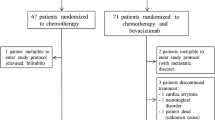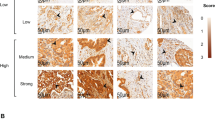Abstract
Following up-regulation of an angiogenesis inhibitor by the wild-type p53 protein proven recently, we have analysed on the one hand the prognostic impact of microvessel count (MC) and p53 protein overexpression in non-small-cell lung carcinoma (NSCLC) progression and, on the other hand, the inter-relation between the microvascular pattern and the p53 protein expression. Moreover, we assessed the expression of vascular endothelial growth factor (VEGF), one of the pivotal mediators of tumour angiogenesis, in order to investigate its relation to p53 protein expression and MC. Tumours from 73 patients resected for NSCLC between March 1991 and April 1992 (median follow-up 47 months, range 32-51 months) were analysed using an immunohistochemical method. In univariate analysis, MC and p53 accumulation were shown to affect metastatic nodal involvement, recurrence and death significantly. Multiple logistic regression analysis showed an important prognostic influence of MC and nodal status on overall (P = 0.0009; P = 0.01) and disease-free survival (P = 0.0001; P = 0.03). Interestingly, a strong statistical association was observed between p53 nuclear accumulation and MC (P = 0.0003). The same inter-relationship was found in non-squamous histotype (P = 0.002). When we analysed the concomitant influence of MC and p53 expression on overall survival, we were able to confirm a real predominant role of MC in comparison with p53. With regard to VEGF expression, p53-negative and lowly vascularized tumours showed a mean VEGF expression significantly lower than p53-positive and highly vascularized cancers (P = 0.02). These results underline the prognostic impact of MC and p53 protein accumulation in NSCLC and their reciprocal inter-relationship, supporting the hypothesis of a wild-type p53 regulation on the angiogenetic process through a VEGF up-regulation.
This is a preview of subscription content, access via your institution
Access options
Subscribe to this journal
Receive 24 print issues and online access
$259.00 per year
only $10.79 per issue
Buy this article
- Purchase on Springer Link
- Instant access to full article PDF
Prices may be subject to local taxes which are calculated during checkout
Similar content being viewed by others
Author information
Authors and Affiliations
Rights and permissions
About this article
Cite this article
Fontanini, G., Vignati, S., Lucchi, M. et al. Neoangiogenesis and p53 protein in lung cancer: their prognostic role and their relation with vascular endothelial growth factor (VEGF) expression. Br J Cancer 75, 1295–1301 (1997). https://doi.org/10.1038/bjc.1997.220
Issue Date:
DOI: https://doi.org/10.1038/bjc.1997.220
This article is cited by
-
Inhibitory effects of quercetin on angiogenesis of experimental mammary carcinoma
Chinese Journal of Clinical Oncology (2005)
-
A Three-dimensional Analysis of Blood Vessels in Bronchioloalveolar Carcinoma
Lung (2004)
-
Exploration on effect and mechanism of Suiqing Pill on tumor angiogenesis in nude mouse b16 melanoma model
Chinese Journal of Integrative Medicine (2004)
-
A high vascular count and overexpression of vascular endothelial growth factor are associated with unfavourable prognosis in operated small cell lung carcinoma
British Journal of Cancer (2002)
-
The role of microvessel density on the survival of patients with lung cancer: a systematic review of the literature with meta-analysis
British Journal of Cancer (2002)



